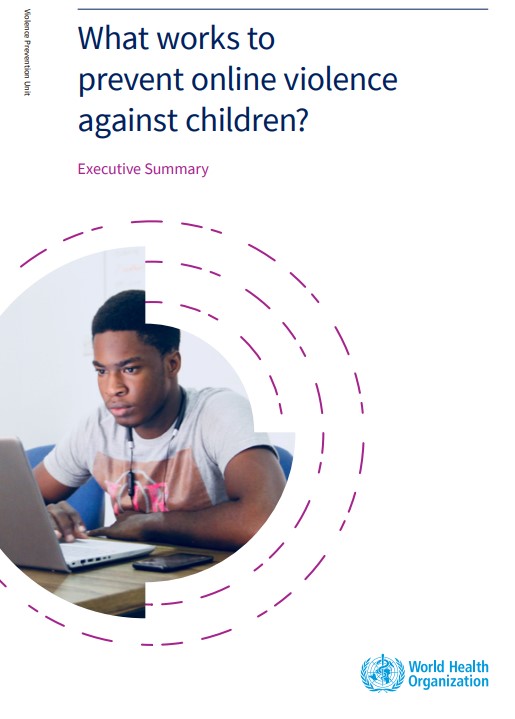A new report published today by the World Health Organization (WHO), What works to prevent online violence against children, presents ways to address the growing worldwide concern of keeping children safe online. With a specific focus on two forms of online violence: child sexual abuse including grooming and sexual image abuse; and cyber aggression and harassment in the form of cyberbullying, cyberstalking, hacking and identity theft, the report showcases strategies and best practices to better protect children.
“Our children spend more and more time online; as such, it is our duty to make the online environment safe,” notes Etienne Krug, Director of the WHO Department of Social Determinants of Health. “This new document provides for the first time a clear direction for action by governments, donors and other development partners, showing that we must address online and offline violence together if we are to be effective.”
Strategies to protect children against online violence
To prevent online violence against children, the report highlights the importance of implementing educational programmes directed at children and parents. Studies have shown the effectiveness of such programmes in reducing the levels of violence victimization, perpetration and associated risk behaviors like alcohol and drug abuse.
The report recommends implementing school-based educational programmes that have multiple sessions, promote interaction among youth and engage parents. It also underscores the importance of training youth in specific life skills such as assertiveness, empathy, problem-solving, emotion management and help seeking, among others. Moreover, educational programmes are more successful when they use multiple and varied delivery formats such as videos, games, posters, infographics and guided discussions.
The report shows evidence that comprehensive forms of sex education can reduce physical and sexual aggression, in particular dating and partner violence and homophobic bullying. The effectiveness of sex education has been confirmed in countries of all income levels.
Improving response to online violence against children
The report highlights the need for improvements in several areas including:
- the need for more violence prevention programmes that integrate content about online dangers with offline violence prevention, given the overlap of these problems and the common approaches to prevention;
- less emphasis on stranger danger as strangers are not the sole or even the predominant offenders in online violence against children;
- more emphasis on acquaintance and peer perpetrators, who are responsible for a majority of offenses; and
- more attention to healthy relationship skills, since romance and intimacy-seeking are major sources of vulnerability to online violence.
Internet access offers many possibilities for children and young people, including fostering learning, developing personal and professional skills, expressing creativity and participating in society. Governments need to find the right balance between fostering opportunities for young people through the digital environment and protecting them from harm. WHO is committed to contributing to existing efforts to better understand all forms of violence against children and help guide the international response.
Note to editors
As part of its public health approach, WHO provides assistance in four key areas: (1) support for data collection on violence against children; (2) research into the factors that can increase or decrease violence; (3) implementation and evaluation of interventions and (4) scaling up evidence-based interventions such as those illustrated in INSPIRE: Seven strategies for Ending Violence Against Children.
Partners in the production of the report What works to prevent online violence against children include researchers from the Crimes against Children Research Center at the University of New Hampshire in Durham, USA, and Queensland University of Technology in Brisbane, Australia.
RELATED LINKS
